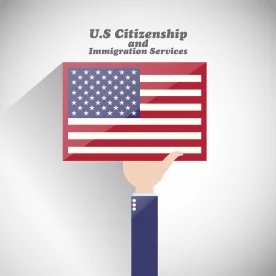Due to a recent system conversion at the United States Citizenship and Immigration Services (USCIS), all I-829 receipt notices and ASC Appointment notices are now delayed 90 days or more. This may be dismaying for many EB-5 investors and their dependent family members who may have waited a long time to reach this final step in the EB-5 process. Since the I-829 petition can only be filed 90 days prior to the expiration of the EB-5 investor’s conditional permanent resident (CPR) status, the 90+ day delay in the issuance of receipt notices on the part of USCIS is at the top of the list of problems plaguing the I-829 process right now. It appears to be especially problematic for those I-829 petitioners and dependents who are located outside of the United States at the time the I-829 petition is filed.
Essentially, the I-829 receipt notice extends the CPR status of the petitioner and his or her dependent family members for one year from the expiration date of the petitioner’s conditional green card. The official receipt notice and Verification of Inclusion of a Dependent are then used as evidence by the petitioner and dependents to reenter the United States, among other things, when their conditional green cards expire. Therefore, those EB-5 investors and dependents who are still abroad when their CPR status expires face having to remain outside of the United States until USCIS issues their I-829 receipt notices.
EB-5 based investors may need to remain abroad to wait out the 90 days (or more) until USCIS issues their I-829 receipt notices in order for them to reenter the United States, renew their driver’s licenses, attend school, etc. Repeated inquiries to the Immigrant Investor Program Office (IPO) email box to request the receipt notices in different I-829 cases have all resulted in a similar message:
Thank you for your inquiry. Due to a system conversion, I-797 Receipt notices for beneficiaries of new I-829 filings have been delayed but continue to be issued. Please allow 90 days from the date of filing to receive the I-829 receipt notice for both the petitioner and associated derivatives. Furthermore, evidence pertaining to the current immigration status of a petitioner and their associated derivatives can still be obtained through an INFOPASS appointment with their local field office. Please go to USCIS’ website uscis.gov for more information regarding how to obtain an INFOPASS appointment. Unless it is an emergent situation, we request that you allow the full 90 days to elapse before seeking an INFOPASS appointment. The Immigrant Investor Program Office (IPO) is working to issue I-797 Receipt Notices, which provides evidence of the petitioner’s and their derivatives’ current status as quickly as possible. We appreciate your continued patience.
Here, USCIS recommends that the client obtain an InfoPass appointment, but only after allowing the complete 90 days to pass before scheduling an appointment, while they work on fixing the problem. At the InfoPass appointment, the I-829 petitioner and his or her dependent family members can obtain an I-551 stamp in their passports, which will extend their CPR status for up to one year. The I-551 stamp will allow the individual to reenter the United States, renew a driver’s license, and apply for school amongst other things. You may visit the following USCIS website to schedule an InfoPass appointment at a location nearest to you: https://my.uscis.gov/appointment
This seems like a temporary solution to the problem, and may assist many who are affected by the delay in the issuance of I-829 receipt notices. However, this recommendation does not come without complications. For I-829 petitioners already located in the United States prior to the expiration of their conditional green cards, there appears to be few obstacles for obtaining I-551 stamps at an InfoPass appointment. They appear to be able to simply pull the receipt number for the filing from the filing fee check cashed by USCIS (the “WAC” number should be printed on the cashed check), schedule an appointment online, bring a copy of their expired CPR card and valid passport, and USCIS will likely issue an I-551 stamp.
However, for dependent family members, even for those who are located in the United States while their CPR status expires, the process of obtaining an I-551 stamp may not be not so simple. There are reports that dependents of I-829 petitioners who show up for the InfoPass appointment are not being picked up in the USCIS system as included in the I-829 petition. In these instances, the officer at the InfoPass appointment tells the dependent that they cannot be found in the system and therefore USCIS cannot grant the dependent an I-551 stamp. The officer then says that the dependent must file his or her own I-829 petition, and without much more explanation than that the appointment is over. This can cause panic for the EB-5 investor and dependents, and leaves them with many questions. This can result in many follow up emails to the IPO which can last several weeks until the Verification of Inclusion of a Dependent is issued and received by the dependent.
Obtaining an InfoPass appointment appears to be even more difficult for both I-829 petitioners and dependents residing abroad with an expired conditional permanent green card and where the receipt notices have not yet been issued by USCIS. In this case, they must travel to the nearest USCIS field office or U.S. Embassy or Consulate which may require an airplane ride. For example, Chinese foreign nationals must travel to the Beijing or Guangzhou office. Here, they will file an I-131A Application for Carrier Document or “travel letter” which, if granted, authorizes the I-829 petitioner or dependent to board an airplane and reenter the United States for up to a period of one year. Individuals in Vietnam can go to the U.S. Consulate in Ho Chi Minh City to obtain a travel letter. This may be a better option than visiting the nearest district office for an InfoPass appointment, which for Vietnam would be scheduled at the nearest office in Bangkok, Thailand.
For those who are able to reach a distant USCIS international field office location, U.S. Embassy, or U.S. Consulate, receiving the actual travel letter is a completely separate obstacle and it may be difficult to obtain. U.S. Embassies and Consulates are typically judicious with issuing travel letters and the process can be very timely and expensive. The individual applicant must pay a $575 USD fee prior to filing a I-131A application, which covers one carrier document/travel letter per applicant. The price can quickly add up for those with several dependent family members.
So what can the I-829 petitioner and dependents do? For those who are still in the preparation stages of filing their I-829 petitions, it may be helpful to be present in the United States at the time the I-829 petition is filed and remain in the United States until the receipt notices are issued and delivered in hand. Although, not a requirement for the I-829 petitioner, remaining in the United States may help avoid getting stuck outside of the United States for a few months during the 90+ day delay.
The second option for I-829 petitioners and dependents for whom being present in the United States at the time of filing is not an option, they may wish to consider filing their I-829 petition immediately upon opening of the filing window (which is 90 days prior to the expiration of the EB-5 investor’s CPR status). This may give USCIS enough time, 90 days, to issue the receipt notices for the petitioner and dependents. If the receipt notices are still not received within 30 days of filing, the petitioner and dependents may consider returning to the United States prior to the expiration of their CPR cards.
Those who absolutely cannot return to the United States prior to the expiration of their CPR status will likely have to either try and obtain a travel letter or wait it out abroad until the receipt notices are finally issued and delivered. There is always the option of sending inquiries to USCIS. On the plus side, it has been reported that the IPO has improved on its responsiveness to inquiries in the past year or so. The final results of contacting the IPO are typically mixed, however, with some responses stating that receipt notices will be issued within 90 days, but in reality it takes them much longer. While the IPO also asks inquirers not to follow up frequently and to refrain from duplicate inquiries as they further delay response time, follow ups are usually necessary. This goes for all missing I-829 receipt notices, missing ASC biometrics appointment notices, misspelling of names by USCIS which all too frequently occurs in these notices, and also to request updates on I-829 petitions that are pending past the posted processing times which are now at 23 to 30 months.
The I-829 process is the final step in the long road to lawful permanent resident status for EB-5 investors and their dependent family members and this delay does not make this journey easier. Hopefully, this problem can be fixed by USCIS soon. For those EB-5 investors preparing to file I-829 petitions, plannning in advance and being present in the United States with your dependent family members, either at the time of the I-829 filing or prior to the expiration of your conditional permanent resident status may help.



 />i
/>i

